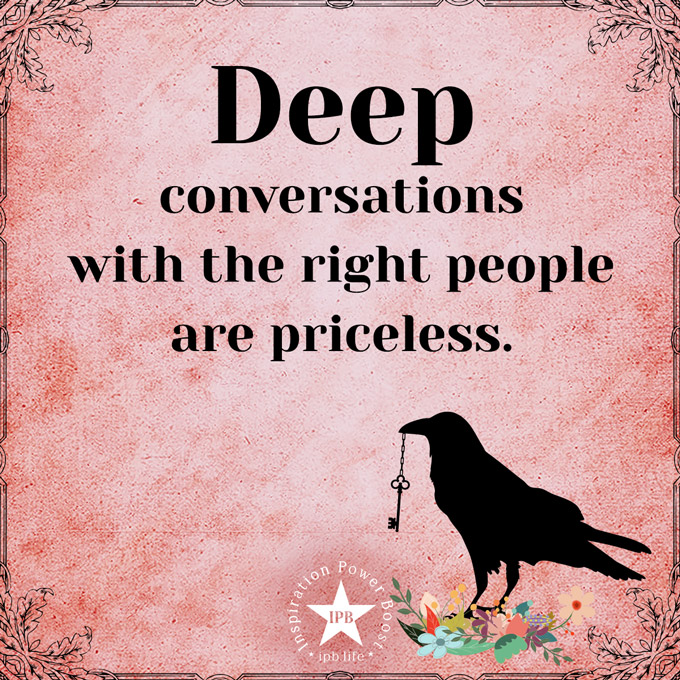
Graphic © InspirationPowerBoost.com (with permission)
“Deep conversations with the right people are priceless.”
The Power of Meaningful Conversations
In the age of fleeting digital interactions and superficial exchanges, the value of deep, meaningful conversations cannot be overstated. Such conversations transcend the mundane and delve into the core of our being, allowing us to connect with others on a profound level. They provide a safe space for vulnerability, introspection, and genuine understanding.
With the right person, these conversations can be transformative, offering insights into our own psyche and fostering a bond that’s built on mutual respect and empathy. They serve as a reminder that in a world filled with noise, taking the time to truly listen and be heard is a rare and precious gift.
Historical Anecdote: Socrates and the Art of Dialogue
In ancient Athens, the philosopher Socrates was renowned for his method of engaging in deep, probing conversations. Instead of lecturing, he would ask a series of questions, leading his interlocutor to a deeper understanding of the topic at hand.
This method, known as the Socratic method, was not just a pedagogical tool but a way of life for Socrates. He believed that through dialogue, individuals could arrive at the truth and gain wisdom. His conversations were not about winning arguments but about seeking understanding. Socrates’ commitment to meaningful dialogue ultimately led to his trial and execution, but his legacy lives on, reminding us of the power of genuine conversation.
Socrates, often hailed as the father of Western philosophy, was born in Athens around 469 BC. Unlike many of his contemporaries, he left behind no written records, making much of his life a subject of intrigue and speculation. What is known about him primarily comes from the accounts of his students, most notably Plato.
Socrates was a stonemason by trade but was more renowned for his role as a philosopher and thinker. He spent much of his time in the Athenian Agora, engaging citizens in philosophical dialogues, challenging their beliefs, and urging them to seek knowledge and virtue.
His method of inquiry, known as the “Socratic method,” was revolutionary. Instead of providing direct answers, Socrates posed a series of questions, leading individuals to examine their beliefs critically and often realize the contradictions within them. This method was not just a tool for debate but a profound philosophical approach, emphasizing the importance of self-awareness and introspection.
Socrates believed that true knowledge was attainable only through continuous questioning and self-examination. However, his unconventional methods and often critical view of Athenian democracy didn’t sit well with everyone. In 399 BC, Socrates was put on trial for “corrupting the youth” and “impiety.” Despite being given the opportunity to escape, he chose to stay and face the consequences, believing it was his duty as a citizen of Athens.
He was found guilty and sentenced to death by drinking a cup of poison hemlock. His calm acceptance of death and unwavering commitment to his principles left an indelible mark on Western thought, making him a timeless symbol of courage and integrity.
A Daily Affirmation
“Today, I will seek out meaningful conversations. I will listen with an open heart and speak with authenticity. I recognize the value of connecting deeply with others and will cherish those moments.”
Further Inspirational Quotes
“The best conversations are the ones where you don’t have to worry about what to say next. The words just flow.”
“In a world where everyone is so connected, the most valuable thing you can give someone is your time and attention.”
“True conversation is an exchange of souls, not just words.”
“Listening is an art that requires attention over talent, spirit over ego, others over self.”
“Speak in such a way that others love to listen to you. Listen in such a way that others love to speak to you.”
😳 What Tinnitus Does To Your Brain Cells (And How To Stop It)
After 47 years of studies and countless brain scans done on more than 2,400 tinnitus patients, scientists at the MIT Institute found that in a shocking 96% of cases, tinnitus was actually shrinking their brain cells.
As it turns out, tinnitus and brain health are strongly linked.
Even more interesting: The reason why top army officials are not deaf after decades of hearing machine guns, bombs going off and helicopter noises…
Is because they are using something called "the wire method", a simple protocol inspired by a classified surgery on deaf people from the 1950s...
★ How To Get Rid Of Nail Fungus:
★ Does Your Salad Contain This Vegetable?
★ Top 10 Most Valuable Medicinal Herbs:





